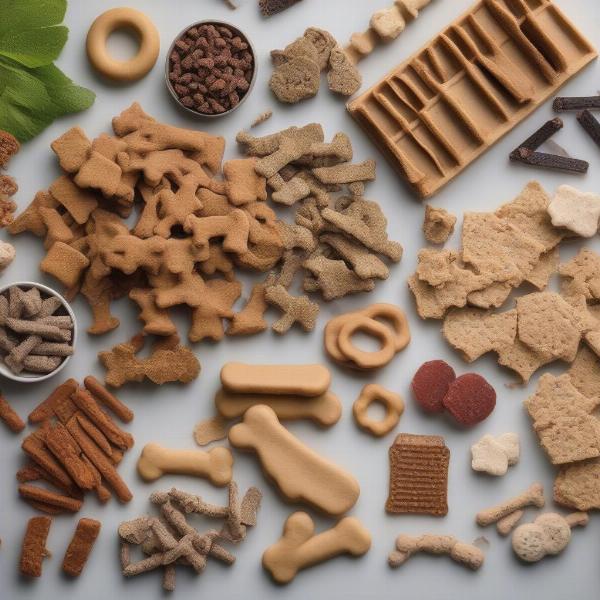Bacon, with its salty, smoky aroma, is a tempting treat for humans, but can our canine companions enjoy it too? While a small amount of cooked bacon may not be immediately harmful to most dogs, it’s not something that should become a regular part of their diet. Bacon treats for dogs present a complex issue with potential benefits and drawbacks that every responsible owner should understand. Let’s delve into the world of bacon and its place in canine nutrition.
Understanding the Risks and Rewards of Bacon for Dogs
Bacon is high in fat and salt, both of which can pose health risks for dogs. Too much fat can lead to pancreatitis, a serious and potentially life-threatening inflammation of the pancreas. Excess salt can contribute to dehydration and, in the long term, can exacerbate existing heart or kidney conditions. The high sodium content in bacon can also lead to excessive thirst and urination, which can be disruptive for house-trained dogs.
However, bacon also contains protein and can be a highly palatable training reward, especially for picky eaters. Used sparingly, a tiny piece of cooked bacon can be a motivational tool. The key is moderation and choosing the right kind of bacon.
Choosing the Right Bacon for Your Dog
Not all bacon is created equal. Avoid giving your dog raw bacon, as it can carry parasites that can cause illness. Always cook bacon thoroughly before offering it to your dog, and avoid adding any seasonings, especially onion or garlic powder, which are toxic to canines. Opt for lower-sodium bacon whenever possible to minimize the salt intake. You can also choose leaner cuts of bacon or drain the cooked bacon on paper towels to remove excess grease.
Healthy Alternatives to Bacon Treats for Dogs
While the occasional small piece of cooked bacon can be a treat, there are plenty of healthier and equally delicious alternatives that you can offer your dog. Consider treats specifically formulated for dogs, which are often lower in fat and salt and enriched with essential vitamins and minerals.
 Healthy dog treat alternatives to bacon: dog treats specifically formulated for dogs.
Healthy dog treat alternatives to bacon: dog treats specifically formulated for dogs.
For a homemade option, try baking small pieces of sweet potato or carrot until they are chewy. These are naturally sweet and provide valuable nutrients. You can also try freezing small portions of plain, unsweetened yogurt or pureed pumpkin for a refreshing and healthy treat.
Can Dogs with Specific Dietary Needs Have Bacon?
For dogs with specific dietary needs, such as pancreatitis, heart disease, or kidney problems, bacon should be strictly avoided. The high fat and salt content can exacerbate these conditions and lead to serious health complications. low fat treats for dogs with pancreatitis are a better option for these dogs. Always consult with your veterinarian before introducing any new food, including bacon, into your dog’s diet, especially if they have pre-existing health concerns.
Conclusion: Bacon Treats for Dogs in Moderation
Bacon, while tempting to share with our furry friends, is best offered in extreme moderation. While a tiny, cooked piece can be a tasty training reward for some dogs, it’s crucial to prioritize their long-term health by opting for healthier alternatives. Remember, a balanced diet and appropriate treats are key to a happy and healthy life for your beloved canine companion. Bacon treats for dogs can be a savory delight, but only when given responsibly. dog bacon treats are not necessary for a balanced diet.
FAQ
- Can I give my dog raw bacon? No, raw bacon can contain harmful parasites and should never be given to dogs.
- How much bacon is too much for a dog? Even a small amount of bacon can be high in fat and salt for a dog. It’s best to offer only a tiny, cooked piece as an occasional treat and prioritize healthier options.
- What are some healthy alternatives to bacon treats for dogs? Dog-specific treats, baked sweet potato or carrot, frozen yogurt, and pureed pumpkin are all healthy alternatives.
- Can dogs with pancreatitis eat bacon? No, dogs with pancreatitis should strictly avoid bacon due to its high fat content.
- What should I do if my dog eats a large amount of bacon? Contact your veterinarian immediately.
- Can puppies have bacon? Puppies are especially sensitive to high fat and salt content. It’s best to avoid giving them bacon.
- Is turkey bacon better for dogs than pork bacon? Turkey bacon is generally lower in fat than pork bacon, but it still contains high levels of sodium and shouldn’t be given regularly.
Related Articles You Might Find Helpful:
About ILM Dog
ILM Dog is your trusted international resource for comprehensive dog care and wellbeing. We offer expert advice on breed selection, health and medical care, training, nutrition, grooming, and much more. From puppyhood to senior care, we’re dedicated to helping you provide the best possible life for your canine companion. Our expertise covers everything from choosing the right breed to understanding your dog’s nutritional needs. For tailored advice or further information, contact us via email at [email protected] or call us at +44 20-3965-8624.